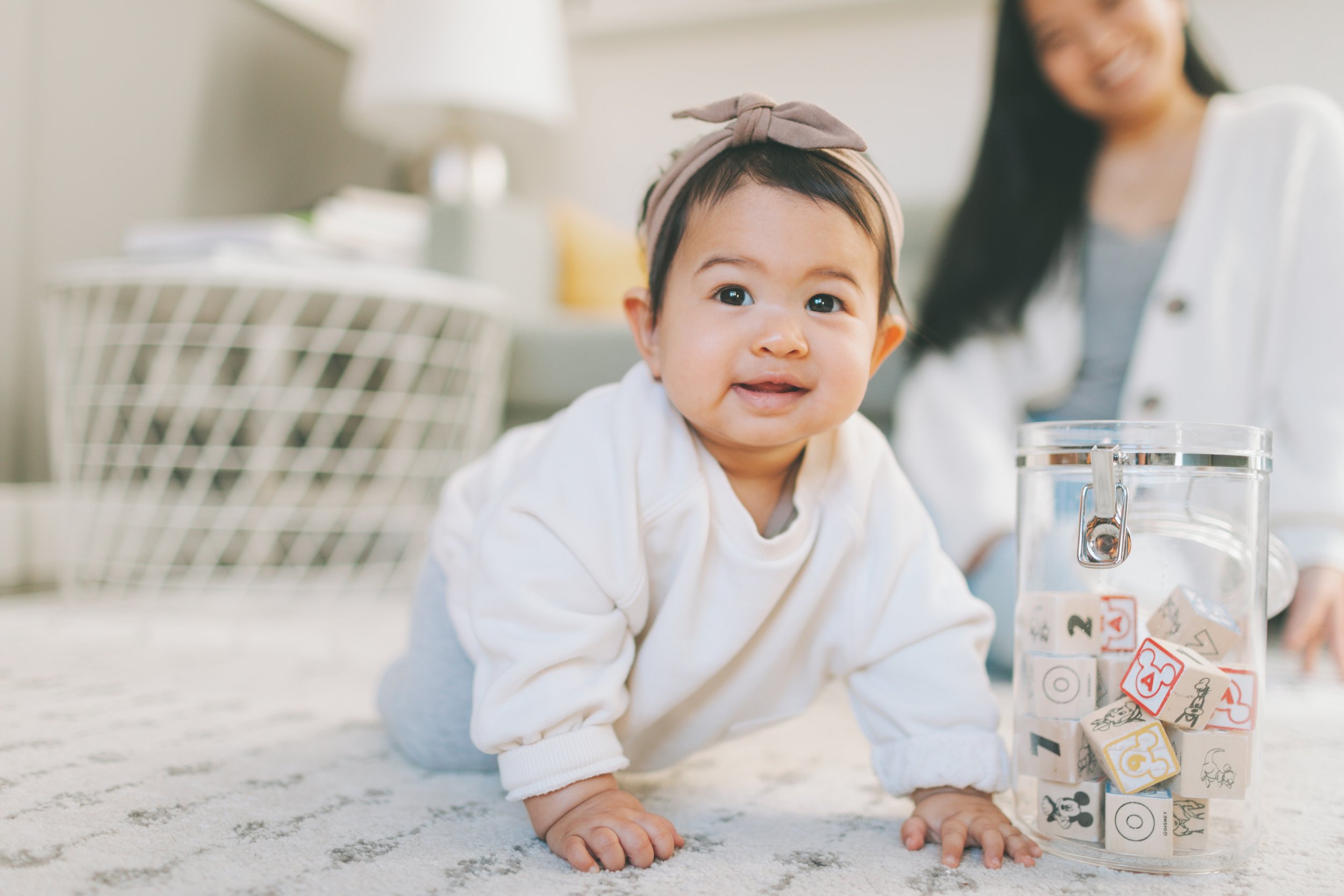When Do Babies Say Mama? How To Teach Your Little One To Say Your New Name
When Do Babies Typically Say “Mama”?
Babies typically say words like “mama” or “dada” by about 12 months old.
Is your little one not saying “mama” yet? First, let us say, you’re not the only one Googling this, The “mama” question is one of the most common questions we hear. You’re definitely not alone!
The first thing to consider is whether or not your baby is old enough and developmentally ready to say “mama”. If your baby isn’t quite at the one-year mark yet, you might just need to wait a little bit longer.
Once your baby reaches 12 months of age, try to be patient with them.
Rest assured that once your baby can talk, they will talk. Babies and toddlers don’t just hold back on us for no reason. But if they’re not talking much yet, it could have to do with their inventory of speech sounds. It could also be because the foundational skills necessary to talk are not yet fully developed.
What To Do If Your Baby Won’t Say “Mama”
The first thing we want you to do is to keep it low pressure! We always want to keep communication light and fun! If your little one senses pressure—which often just comes from a well-meaning, deep desire to hear your little one say ‘mama’—it usually has the opposite effect. They tend to shut down.
Trying to work on ‘mama’ in the fun and playful ways we’ve outlined below. They’ll be more motivating to your child! And remember that little ones need lots of repetition and that all the repetition you’ll engage in with them truly does pay off. So keep at it and avoid the temptation to make it a high-pressure situation.
Work On The “M” Sound
If your baby isn’t saying ‘mama’ yet but you’re pretty sure they’re ready to, pay attention to their babbling and when they’re just playing around with their voice. Do you hear them making an /m/ sound every so often? If so, you can skip this section.
If not, or if it’s rare, “mama” will be a harder word for them to say until they learn it. Start playing with an /m/ sound during mealtime or with pretend food during play exaggerating by saying “Mmmmm!” when you eat something. Remember no, pressure, just model the sound and draw attention to your mouth. It helps to be animated when you do it!
You can also work on the /m/ sound by engaging your child in mirror play while you model it. Just remember to be silly, have fun, and keep it low-pressure.
Create Opportunities To Say Mama
Here are two fun, low-pressure ways to practice saying ‘mama’ with your baby:
#1 Play Peek-a-Boo. But, instead of saying “Boo,” say “Mama!”
#2 Play a very simple version of Hide and Seek. (You’ll need another person to help your little one with this one.) While you’re hiding, have the other person model saying, “Mamaaaa! Where are you?! Maaaama!” Modeling in a sing-song voice like this is helpful to your little one and gives you lots of fun opportunities to practice.
Make A Photo Book
We love practicing names (including Mama) by making a photo book of the people who live in your home. We recommend using the small photo books you can buy from the dollar store, to keep this easy, because this is more of a toy than a keepsake.
When you “read” the photo book with your little one and get to a page with a picture of you, say “Mama,” and hold the photo up by your face. This way, you’re drawing attention to your mouth, which allows you to model and say, “Mama! That’s Mama!” in an exaggerated way. And, if someone else is reading to your little one, they could say, “That’s Mama! Hi Mama!”
If you keep it low-pressure and model, model, model, you—and they!—will do great!
Introduce Sign Language
We love teaching babies and toddlers basic sign language. Introduce the sign for mama and model it repeatedly. You can try this with the ideas we’ve mentioned above such as the photo book. When you point to mama, you’ll want to use both the sign and the spoken word as you say “mama!”
Interested in teaching your little one to sign? You’ll want to check out our full blog post on sign language for toddlers.
Let’s Get The Words Rolling!
We’ve created tons of free resources that teach you how to get your baby talking and communicating more at home. If you find these tips helpful, we know you’ll love them, too!
Baby Bundle (0-12 Months)
If you have a little one ages 0 to 12 months, grab the Baby Bundle! Just click the link below, drop your email address, and we’ll send you a baby talking milestones, our “All About First Words” freebie, and a baby song video!
Toddler Talking Milestones (13-30 Months)
If you have a little one 13 months and up, our toddler talking milestones checklist is for you. It will give you instant insight into which skills your toddler has down pat, which skills they’re working on, and what’s coming up next!

